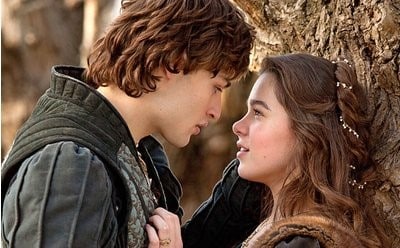Romeo Montague is one of the main characters in William Shakespeare’s play Romeo and Juliet. Read our Romeo character analysis below:
After the brawl between servants of the two feuding families in the market square in Verona we are introduced to Romeo. He’s a teenager with raging hormones, wandering around in a daze, completely lovesick. He has seen a girl, Rosaline, and fallen in love with her. She’s not aware of that, she’s not even aware of Romeo’s existence. And now, he can’t get her out of his mind.
His friends, a gang of teenage boys who hang out in the square together, make fun of him for it. It’s a great, natural, life-like beginning to a play and a fitting first impression of this innocent boy who is going to have to cope with the realities that a hostile universe is going to confront him with.
But in this play it is a particularly apt beginning: this moping for a pretty, unattainable girl is the emotional rock bottom from which Romeo Montague is going to rise, in a very difficult and uncertain climb, to the status of tragic hero.
When Romeo meets Juliet there is a progressive deepening of his character, although his immaturity is evident throughout. Unlike Juliet, who shows a remarkable level of maturity right from the start, he only really gets there in the last hours of his life.
This first sign that he will develop into something more than a teenage hangout is just before entering the Capulet mansion to gatecrash their party, when he seems aware of the heavy weight of Fate hanging over him, and he broods on the future: ‘My mind misgives/Some consequence yet hanging in the stars.’ The Prologue has told us that the lovers are star-crossed, and that is something that’s reflected in the language throughout the text of the play.
Romeo Montague is hasty and impetuous, with quickly changing moods. He serially falls in love at first sight; marries Juliet the day after meeting her and takes revenge for Mercutio’s death without stopping to consider the consequences. He is banished from Verona and his mother, Lady Montague, dies of grief.
When confronted with the consequences of his actions he’s unable to cope with the trouble he’s landed himself in. After killing Tybalt he flees to Friar Lawrence’s cell and descends into a childlike emotional state – becoming distraught, crying, and losing control of himself. He behaves like a toddler and his language is pure hysteria.
Then again, in exile in Mantua, Romeo’s impulsivity is once again evident when, on hearing of Juliet’s death, he cries, ‘then I defy you, stars!’ and springs into action. When he’s in the tomb with Juliet he instantly resolves to kill himself there and then, in the tomb with her. However, although too late, at that point, in his soliloquy beside her body (‘How oft when men are at the point of death/Have they been merry.’) we see a man who has finally arrived at an understanding of himself and a maturity which, apart from a few flashes in his dialogue with Juliet, he has lacked.
Top quotes by Romeo Montague
“Under loves heavy burden do I sink.”
“Did my heart love till now? forswear it, sight!
For I ne’er saw true beauty till this night.”
“If I profane with my unworthiest hand
This holy shrine, the gentle sin is this:
My lips, two blushing pilgrims, ready stand
To smooth that rough touch with a tender kiss.”
(act 1, scene 5)
“O! she doth teach the torches to burn bright!”
(act 1, scene 5)
“It seems she hangs upon the cheek of night
Like a rich jewel in an Ethiop’s ear;
Beauty too rich for use, for earth too dear.”
(act 1, scene 5)
“He jests at scars that never felt a wound.”
“But, soft! what light through yonder window breaks?
It is the east, and Juliet is the sun.”
(act 2, scene 2)
“See how she leans her cheek upon her hand.
O, that I were a glove upon that hand
That I might touch that cheek!”
(act 2, scene 2)
“Oh, I am fortune’s fool!”
“Then I defy you, stars.”
“Death, that hath suck’d the honey of thy breath hath had no power yet upon thy beauty.”

Romeo Montague woos Juliet Capulet




Leave a Reply
Want to join the discussion?Feel free to contribute!